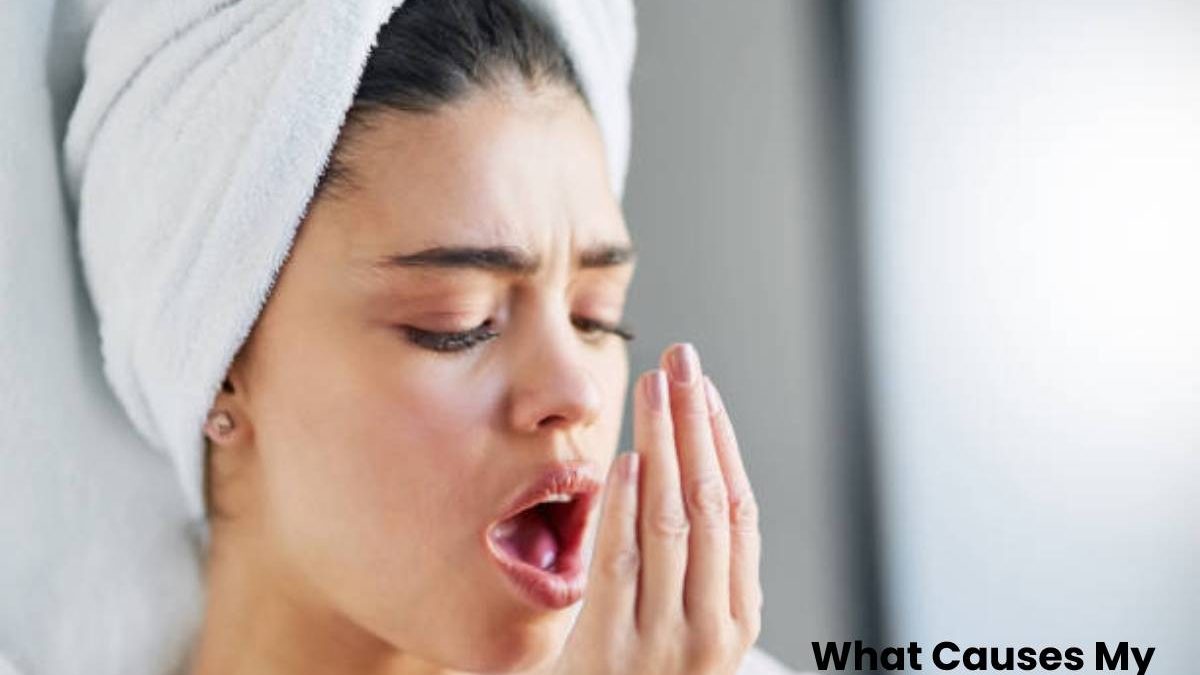What Causes My Bad Breath? – But what are the most common causes, and how to prevent and treat them? Doctors on Live take stock.
Bad breath is common and can affect even the biggest fan of toothbrushes and floss. But what are the most common causes, and how to prevent and treat them? Doctors on Levi take stock.
Table of Contents
What Causes My Bad Breath?
The GPs on Live explain the causes of bad breath and give you the best advice on treating and preventing it.
We’ve all had bad breath (also known as halitosis) at some point in our lives, whether it’s morning breath or the result of eating a spicy or spicy diet. If your breath smells bad and you notice it, it can be a source of stress, especially in society or when you approach your partner.
Here are the leading causes and easy steps to reduce bad breath.
What Causes Bad Breath Mainly?
Bad breath is usually the result of too much bacteria in the mouth, which produce odorous gases called “volatile sulfur compounds”. These sulfur-producing bacteria typically live on the tongue’s surface and in the throat.
Lifestyle, illness, or certain foods can cause bad breath because they trigger these bacteria to emit odors. If you regularly have bad breath, it could also signify a dental problem or an underlying health condition. If this worries you, talk to a doctor or dentist, depending on the symptoms.
What Are The Causes Of Bad Breaths?
1. Poor Oral Hygiene
The most common reason for bad lungful, especially in children, is poor oral hygiene. Not brushing your teeth can lead to an excessive buildup of bacteria between the teeth and the gums, responsible for bad lungful. Bad oral habits can lead to cases of gingivitis and the formation of cavities.
2. Smelly Foods
Various foods, such as garlic, onions, chives and spices, can cause bad breath. Garlic and onions are part of the same family of vegetables containing sulfur compounds, the source of their flavor.
Once these foods, their components are absorbed bloodstream and transported to the lungs through breathing. Your breath then starts to smell bad.

3. Gingivitis
Persistent bad sniff can signify gingivitis (inflammation of the gums). Gingivitis can cause bad breath due to plaque buildup along the germline.
If food particles are not regularly, this provides harmful breath bacteria with a breeding ground.
4. Dry Mouth
Dry mouth often occurs when saliva production decreases. Saliva helps clean the mouth by removing bacteria and food residue. A dry mouth can therefore make you prone to bad breath.
You will naturally have a more dry mouth at night because your salivary glands produce less saliva, so you often have bad breath in the morning.
The dry entrance can also be a side effect of certain medications, including birth control pills, antidepressants, and sleeping pills. Alcohol, stress or dehydration can also be the cause.
5. Underlying Health Issue
Diseases that can affect the airways can also affect the smell of your breath. They include:
- Asthma;
- Cystic fibrosis;
- Postnasal drip;
- Angina;
- Sinusitis;
- Bronchitis ;
- Pneumonia.
Diabetes can also affect your breath due to increased glucose levels in saliva, which promotes the growth of bacteria, the appearance of gingivitis, and cavities formation.
If your breath smells fruity or smells like acetone, the chemical found in, for example, nail polish remover, it may be a sign of diabetic ketoacidosis. This phenomenon occurs when the organs do not have access to their primary fuel, glucose, which remains trapped in the blood in the event of diabetes. In this case, the body burns fat instead of glucose. The ketones released by this process produce a waste product that causes the odor.
6. Acid Reflux
Bad breath is a shared symptom of chronic acid reflux or gastroesophageal reflux disease (GERD). In this case, the stomach contents, including stomach acid, bile and undigested food, back up into the esophagus, the tube that carries food from the mouth to the stomach. It can give a bitter or sour taste to the mouth.
Acid reflux can also cause bacteria that infect the stomach, namely Helicobacter pylori. If your bad breath is a recent problem and you haven’t eaten anything to cause acid reflux, talk to a doctor.
7. Restrictive Diets
Decreasing carbohydrates, fasting, and dehydration caused by overly restrictive diets can also cause your breath to smell fruity or acetone. Such a diet can encourage the body to break down fats rather than carbohydrates for energy, thus promoting the release of ketones on your breath.
8. Smoking
In addition to staining teeth, irritating gums and upsetting taste buds, tobacco can also cause bad breath. When you smoke, the chemicals in the cigarette stick to the surface of the teeth and gums, which leads to an increased number of sulfur-producing bacteria.

How To Get Rid Of Bad Breath?
The good update is that there are several easy ways to alleviate bad breath.
Chew Fresh Mint Or Parsley After A Meal
It can help neutralize mouth odors caused by sulfur compounds.
Keep Your Teeth Clean
Gently brush your teeth and gums at least twice a day for 2 minutes using fluoride toothpaste.
Use Dental Floss Or A Tongue Brush
Once a day, clean the space between your teeth with interdental brushes or dental floss, and gently brush your tongue with a tongue scraper or a tongue brush. You can also use your toothbrush to brush your tongue crosswise six times in a row: this induces a significant reduction in bacteria and halitosis.
Not Rinsing Your Mouth Immediately After Brushing
This practice would dilute the fluoride in toothpaste and reduce its protective effects. You should also not eat or drink within 30 minutes of fluoride mouthwash.
Chew Sugar-Free Gum Between Meals
It can also prevent dry mouth by helping your salivary glands stay stimulated.
Adopting the following habits can also help fight bad breath.
To Drink A Lot Of Water
It will help prevent dry mouth and remove food particles between routine brushings.
Stop Smoking
In addition to avoiding stains on your teeth, your breath will be fresher.
Limit Sugary Foods And Carbonated Drinks
These promote the growth of bacteria and encourage them to produce acid, which supports the formation of cavities and dental erosion.
Have Your Teeth Checked Regularly
It will help you preserve a healthy mouth and prevent dental problems.
When Should I See A Doctor?
There’s probably an underlying reason why these solutions don’t have the desired long-term effects.
Talk to a doctor if:
- Your bad sniff does not go away after treating it yourself for a few weeks;
- You have bad breath associated with other symptoms, including acid reflux;
- You are taking medication that could potentially cause bad breath.

